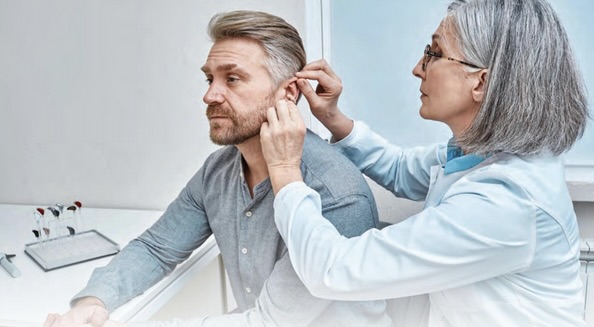
Courtesy HEARING SERVICES of McKINNEY
Hearing is about so much more than catching the punchline in a conversation or hearing a favorite song clearly. The tiny structures inside your ears connect directly to the health of your brain, influencing how sharp you feel, how steady you walk, and even how connected you feel to the world around you.
Research is showing that untreated hearing loss doesn’t just make communication harder—it’s linked to faster cognitive decline, dementia, depression, and anxiety. In fact, a long-term Johns Hopkins study found that people with mild hearing loss had about twice the risk of developing dementia, moderate loss tripled the risk, and severe loss increased it fivefold. That’s not just a small correlation; it’s a clear signal that the brain and ears are working together in ways we can’t afford to ignore.
When hearing starts to fade, the brain has to work harder to fill in the blanks. This extra mental strain can leave fewer resources for memory and problem-solving. Over time, that constant effort can contribute to cognitive decline. It’s called the “cognitive load” effect, and it’s one of several ways hearing loss impacts brain health. Another is auditory deprivation—when the brain receives less sound input, it can lead to changes in brain structure, particularly in areas responsible for memory and language.
There’s also the human side. Struggling to hear often leads to pulling back from conversations, social gatherings, and community life. That isolation has its own risks. Studies have shown loneliness can raise the risk of dementia by about 40%. Add in the frustration of missed conversations, and it’s no surprise that untreated hearing loss is also associated with higher rates of depression and anxiety.
Here’s the encouraging news: treating hearing loss can help lower those risks. A major study published in The Lancet in 2023 found that older adults at high risk for dementia who used hearing aids, along with audiologist-guided support, slowed their rate of cognitive decline by nearly 50% over three years compared to a control group. Other large reviews of research have found that hearing-aid or cochlear implant use can cut the long-term risk of cognitive decline by almost 20% while also improving day-to-day mental sharpness.
The benefits don’t stop at brain health. Wearing hearing aids can reduce the chances of developing depression or anxiety and even lower the risk of serious falls. That’s because your hearing plays a key role in spatial awareness—helping you know where you are in relation to your surroundings.
The decision to get your hearing checked isn’t just about improving how well you hear the TV or the phone. It’s about protecting your overall well-being. Early detection is especially important because hearing loss often develops gradually. Many people don’t realize how much they’ve adapted—turning up the volume, avoiding noisy places, leaning on lip reading—until the change in hearing is undeniable. By then, the brain may have already been compensating for years.
Modern hearing aids are far from the bulky, squealing devices of decades past. Today’s models are discreet, comfortable, and smart—able to filter background noise, stream calls and music, and adapt automatically to different environments. More importantly, they can restore the clear, effortless hearing that allows the brain to focus on what matters: understanding, remembering, and connecting.
If you’ve been noticing changes in your hearing—needing to ask people to repeat themselves, missing parts of conversations, or feeling exhausted after social interactions—it may be time to make an appointment with an audiologist and have your hearing tested. Even if you’re not sure there’s a problem, a professional evaluation from an audiologist can give you a clear picture of your hearing health and whether hearing aids could help.
The sooner hearing loss is addressed, the more you can protect not just your ability to hear, but also your cognitive health, mood, and quality of life. Your ears may be the entry point for sound, but they’re also guardians of your mind. Schedule your hearing check-up today with Hearing Services of McKinney and take the first step toward protecting both your hearing and your brain health.
Learn more at: https://hearinmckinney.com/


